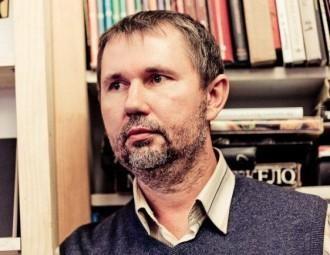Ihar Babkou won Jerzy Giedroyc Prize
 photo by EuroBelarus Information Service
photo by EuroBelarus Information Service
“Minute: Three stories” is the best book in Belarusian in the genres “poetical fiction” and “essay”.
On June 2 the winner of Jerzy Giedroyc Prize was announced in Minsk. Ihar Babkou, the philosopher and writer was awarded the first prize, and “EuroBelarus” congratulates him with the victory!
The book “Minute: Three stories” was recognized as the best book in Belarusian in the genres ‘poetical fiction’ and ‘essay’.
The book of the winner is about the places in which we come and where we come to stay.
Ihar Babkou says that he will spend 10 thousand euro for “good things”: “Good things shouldn’t be made public. They should be made quietly; in this way good deeds come to karma”, the author said.
As to the new book, “well, if not the whole typescript, but two thirds of it is ready”. Though Ihar Babkou noted that “one can’t talk about the book until it’s printed”.
At the ceremony in the congress hall of the Minsk hotel Victoria in the evening on June 2 the philosopher received a check for 10 thousand euro from the “Idea Bank”, a partner of the award.
Second place went to Artur Klinau and his book “Empties”. He was presented with a trip to Gotland, Sweden.
The prize for the third place, which is a trip to Wrocław, Polnad, was given to Vintses Mudrou with the collected stories “Bahun”.
Let us recall that all in all six authors were shortlisted for the prize: Ihar Babkou, Alena Brava, Siarhei Veratsila, Artur Klinau, Vintses Mudrou and Lyudmila Rubliouskaia.
The Jerzy Giedroyc Prize was established at the end of 2011. It is awarded for the best prose book in Belarusian published the previous year in the genres ‘poetical fiction’ and ‘essay’. As “EuroBelarus” Information Service earlier reported, Uladzimir Niakliaeu received the prize last year.

-
03.01
-
07.10
-
22.09
-
17.08
-
12.08
-
30.09





























